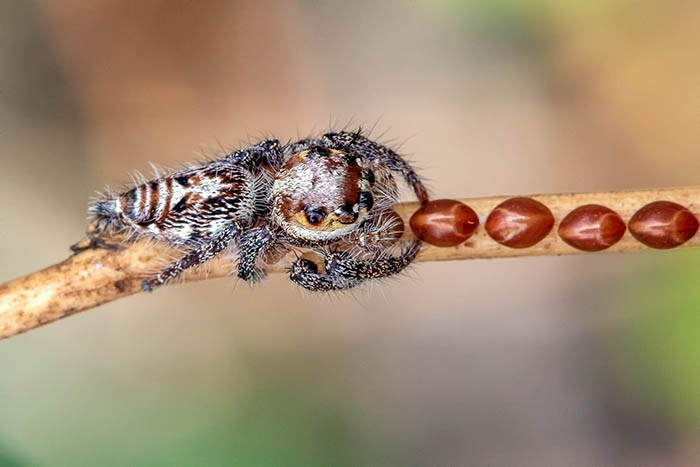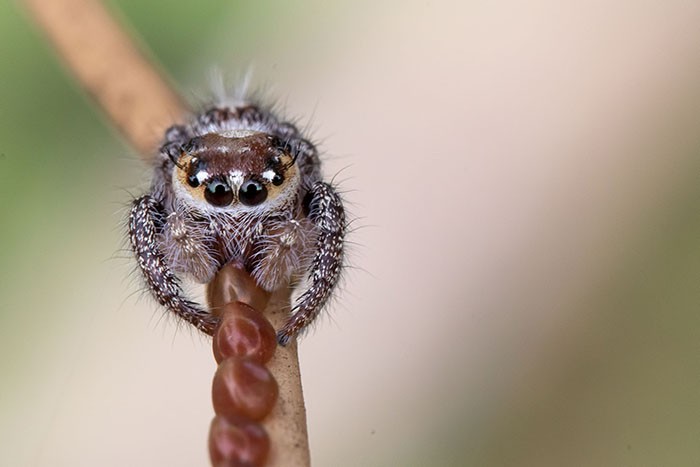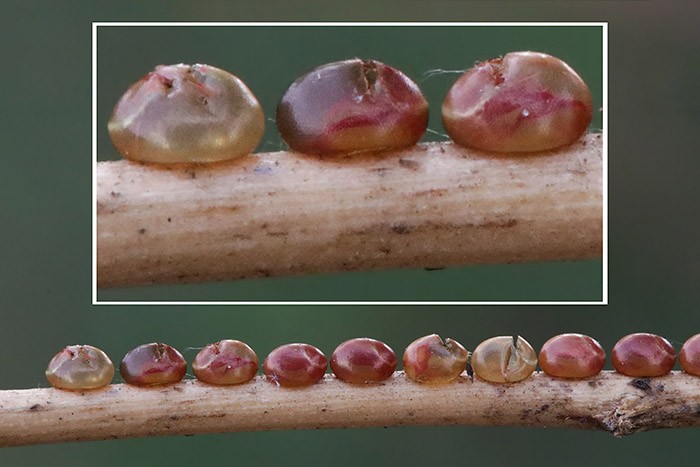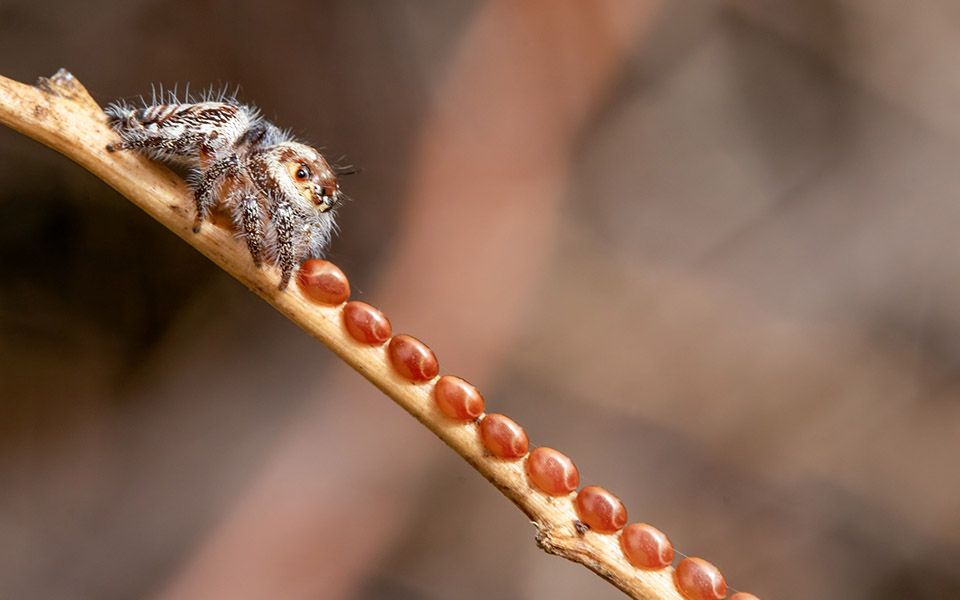►Spider’s newly discovered behaviour photographed for the first time.
►Social media helped in the discovery of the behaviour.
►The discovery is significant as it can help in biological methods of pest-control.
►Dr. Krishna Mohan, a Dakshina Kannadiga, is one of the experts involved in the study.
At a time of widespread complaints regarding misuse of social media by people, here is a heartening story of how social media served a useful purpose in advancing scientific knowledge about a unique species of spiders. Thanks to a sharp observation made by a Facebook user, one of the largest social media platforms in the country, an endemic South-Asian species of jumping spider, Hyllus semicupreus has been discovered to feed on insect eggs for the first time ever.
This behaviour is a new discovery for the species and has been reported by a team of researchers based in Mumbai, based on the inputs provided by a wildlife photographer from Andhra Pradesh. The discovery is significant as it can help in furthering biological means of pest control.

The discovery is published in the latest issue of 'Peckhamia', a globally renowned, peer-acclaimed international scientific journal dedicated to the study of jumping spiders. The study was collaborated with Dr. David E. Hill, a world authority on jumping spiders, and Dr. Richard J. Pearce, a leading British spider expert. It was led by principal author and lead researcher Javed Ahmed, along with co-researchers Rajashree Khalap and Dr. Krishna Mohan, who is a naturalist and surgeon based in Moodabidri. The discovery was reported by wildlife photographer AN Suresh Kumar, who first recorded this behavior and shared his observations with the team.
THE DISCOVERY
Hyllus semicupreus is a large, colourful bronze-colored jumping spider. It was previously recorded for the first time from Mumbai in 2015 and also been photographed across Maharashtra, especially in Raigad district. The spider can be easily identified from photographs and is known to feed on small insects and such.

Recently, and for the first time, wildlife photographer and amateur naturalist AN Suresh Kumar came across the spider feeding on leaf-footed bug eggs (familyCoreidae) on his farmland in Andhra Pradesh. Not knowing, he had clicked a new behavior and shared the photographs on the "Spiders of the Indian Subcontinent", a specialist Facebook group which is focusing on the documentation, identification and study of Indian spiders.
The photographs were spotted by arachnologist and researcher, Javed Ahmed. Realizing the importance of this chance discovery, Ahmed encouraged the photographer to contribute his findings to science to facilitate a better understanding of spiders, which are severely understudied in India compared to other wildlife species such as butterflies, birds and mammals.
'Oophagy' or preying on eggs is an interesting behavior, which, while reported in a number of jumping spiders, has never before been observed in Hyllus semicupreus, a relatively common jumping spider. This discovery is significant because leaf-footed bugs are severe agricultural pests and spiders such as Hyllus semicupreus can be acted as important pest-control agents.

Acknowledging the potential use of social media, Javed Ahmed observes: “In this digital age of lighting fast internet connections and powerful pocket computers (smart phones), which are carried by almost everyone, there's a lot of potential for social media platforms to act as a bridge between scientists and hobby photographers, to bring to light unique observations on the natural world never seen before. An important thing to remember though is, these observations, if not reported on an academic platform, such as a peer reviewed scientific journal, would be otherwise useless and lost forever.”
Photos: A. N. Suresh Kumar
Let the Truth be known. If you read VB and like VB, please be a VB Supporter and Help us deliver the Truth to one and all.
New Delhi (PTI): Star batter Smriti Mandhana, who played a pivotal role in India's historic 2025 Women's World Cup triumph, was named the BBC Indian Sportswoman of the Year for 2025 at a glittering function here on Monday.
Chess prodigy Divya Deshmukh won the Emerging Player of the Year award, for her historic FIDE Women's World Cup triumph at just 20.
Preethi Pal was named the Para-Sportswoman of the Year, for winning two bronze medals at the 2024 Paris Paralympics in track and field, while Anjali Bhagwat was honoured with the Lifetime Achievement Award, recognising her pioneering career as India's first woman shooter to reach an Olympic final and her trailblazing success on the world stage.
Mandhana, who is currently touring Australia with the Indian team for multi-format bilateral assignments, said in a video message: "Thank you BBC for giving me the awardfor Best Sportswoman of the Year. 2025 was a special year for women's cricket, especiallytowards the end we had a World Cup and I'm happy I could contribute and help India win matches.".
At 29, the left-handed batter is already among the game's greats, with the second-highest number of centuries in women's One Day Internationals and ranking third in total runsscored among current players worldwide.
Hailing from Sangli city in Maharashtra, the affable Mandhana was inspired by her father and brother, both of whom played cricket at the district level.
In September last year, she made a 50-ball hundred against Australia – the fastest 50 over international ton (men and women) by an Indian in the format, breaking Virat Kohli's record.
The award winners were decided by a distinguished grand jury comprising Leander Paes, Deepa Malik, and Anju Bobby George.
Praising the athletes' achievements CEO of BBC News, Jonathan Munro said: "Congratulations to this year's winners who showcase the very best in sporting excellence. The BBC World Service is committed to bringing such stories of human endeavour and outstanding success to audiences across India and around the world.".
Additionally, the ceremony also celebrated a wide spectrum of talent and impact, recognizing star performers and changemakers for redefining the landscape of Indian sport.
BBC Star Performers of the Year 202.
• Indian Women's Cricket Team: for their historic World Cup victory.
• Ekta Bhyan, Deepthi Jeevanji and Preethi Pal: for their trailblazing performances at the World Para Athletics Championship.
• Indian Women's Cricket Team for the Blind: for their inspiring World Cup victory.
• Indian Women's Kabaddi Team: for their smashing victory in World Cup.
.
BBC Changemakers of the Year 202.
• Indian Women's Ice Hockey Team: for breaking barriers in a non-traditional sport.
• Rajbir Kaur: Indian field hockey player and former captain of the women’s national team.
• Savita Punia: Indian field hockey player and current member of the national team.
• Paani Devi: recognised for her impactful contribution to grassroots sport.





